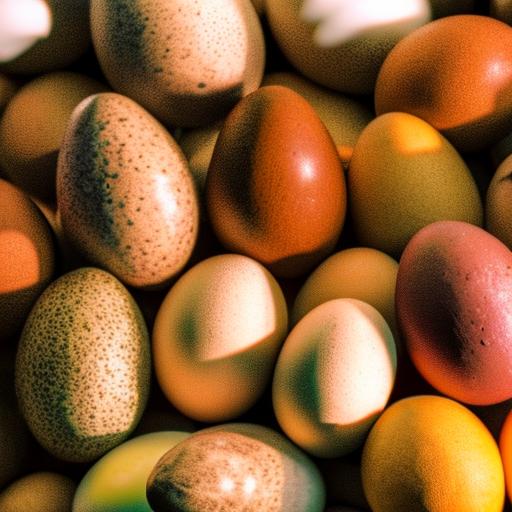When selecting chickens for egg production, breed choice is paramount. Various chicken breeds possess distinct traits that influence their suitability for laying eggs. Key factors include egg size, laying frequency, temperament, and climate adaptability.
These characteristics collectively determine a breed’s effectiveness for specific egg production requirements. This article will examine the attributes of superior egg-laying chicken breeds, highlight the top five breeds for egg production, discuss important considerations when selecting a breed, provide guidance on raising chickens for egg production, and address common misconceptions about chicken breeds and egg laying. Upon completion of this article, readers will gain a thorough understanding of the diverse chicken breeds available for egg production, enabling them to make well-informed decisions when establishing their flock.
Table of Contents
- 1 Characteristics of the Best Egg-laying Chicken Breeds
- 2 Top 5 Chicken Breeds for Egg Production
- 3 Factors to Consider When Choosing a Chicken Breed for Egg Production
- 4 Tips for Raising Chickens for Egg Production
- 5 Common Myths About Chicken Breeds and Egg Production
- 6 Conclusion and Final Recommendations for Choosing the Best Chicken Breed for Eggs
- 7 FAQs
- 7.1 What are the best breeds of chickens for egg production?
- 7.2 What characteristics should I look for in a chicken breed for egg production?
- 7.3 How many eggs can I expect from the best egg-laying chicken breeds?
- 7.4 Do the best egg-laying chicken breeds require special care or housing?
- 7.5 At what age do the best egg-laying chicken breeds start laying eggs?
Key Takeaways
- There are various chicken breeds suitable for egg production, each with its own unique characteristics and qualities.
- The best egg-laying chicken breeds are known for their high egg production, adaptability to different climates, and docile nature.
- Some of the top chicken breeds for egg production include the White Leghorn, Rhode Island Red, Sussex, Plymouth Rock, and Australorp.
- When choosing a chicken breed for egg production, factors to consider include climate, space availability, egg color preference, and temperament.
- Tips for raising chickens for egg production include providing a balanced diet, proper housing, regular health checks, and ensuring access to clean water and nesting boxes.
Characteristics of the Best Egg-laying Chicken Breeds
Productivity and Adaptability
The best egg-laying chicken breeds are renowned for their high productivity, consistently producing a large number of eggs throughout the year. These breeds are also adaptable to different climates and possess a calm and friendly temperament, making them easier to handle and care for.
Desirable Egg Characteristics
In addition to their high productivity, the best egg-laying chicken breeds are known for laying large eggs with strong shells, making them more desirable for consumers. These breeds also tend to have a longer laying cycle, meaning they continue to lay eggs for a longer period of time compared to other breeds.
Diversity and Unique Features
The best egg-laying chicken breeds come in a variety of colors and sizes, allowing for diversity in appearance within a flock. This can be appealing to those who are interested in raising chickens not only for their eggs but also as pets or for show. Some breeds are also known for their unique features, such as feathered feet or crested heads, adding an element of novelty to the flock.
Top 5 Chicken Breeds for Egg Production

1. White Leghorn: The White Leghorn is perhaps the most popular breed for commercial egg production due to its exceptional laying ability. These chickens are known for their prolific egg-laying, producing large white eggs consistently throughout the year.
They are also highly adaptable to different climates and are relatively low-maintenance, making them a top choice for many egg producers. 2. Rhode Island Red: The Rhode Island Red is a classic breed known for its excellent egg-laying capabilities and friendly temperament.
These chickens are known for their brown eggs and their ability to lay consistently even in colder weather. They are also known for their hardiness and adaptability, making them a popular choice for backyard flocks. 3.
Australorp: The Australorp is an Australian breed known for its exceptional laying ability and calm disposition. These chickens are known for their large brown eggs and their ability to lay consistently throughout the year. They are also known for being relatively low-maintenance and adaptable to different climates, making them a top choice for many egg producers.
4. Sussex: The Sussex is a dual-purpose breed known for its excellent egg-laying capabilities and beautiful appearance. These chickens are known for their brown eggs and their ability to lay consistently even in colder weather.
They are also known for their friendly temperament and adaptability, making them a popular choice for both eggs and exhibition. 5. Plymouth Rock: The Plymouth Rock is a versatile breed known for its excellent egg-laying capabilities and calm disposition.
These chickens are known for their brown eggs and their ability to lay consistently throughout the year. They are also known for being relatively low-maintenance and adaptable to different climates, making them a top choice for many egg producers.
Factors to Consider When Choosing a Chicken Breed for Egg Production
When choosing a chicken breed for egg production, there are several factors to consider to ensure that you select the best breed for your specific needs. First and foremost, consider the climate in which you live and choose a breed that is well-suited to your local weather conditions. Some breeds are more adaptable to cold weather, while others thrive in warmer climates.
Additionally, consider the space you have available for your flock and choose a breed that is suitable for your specific setup, whether it be a small backyard coop or a larger commercial operation. Another important factor to consider when choosing a chicken breed for egg production is the size and color of the eggs you prefer. Different breeds produce eggs of varying sizes and colors, so it’s important to select a breed that aligns with your preferences and the preferences of your target market if you plan to sell your eggs.
Additionally, consider the temperament of the breed and choose chickens that are known for being friendly and easy to handle, especially if you are new to raising chickens. Finally, consider the purpose of your flock – whether it be solely for egg production or if you also want chickens that can be used for meat or exhibition. Some breeds are dual-purpose, meaning they can be used for both eggs and meat, while others are specifically bred for high egg production.
By considering these factors when choosing a chicken breed for egg production, you can ensure that you select the best breed for your specific needs and set yourself up for success in raising a productive and healthy flock.
Tips for Raising Chickens for Egg Production
Raising chickens for egg production requires careful attention to their housing, diet, and overall care to ensure that they remain healthy and productive. When it comes to housing, provide your chickens with a clean and well-ventilated coop that offers protection from predators and extreme weather conditions. Additionally, ensure that your coop has enough space for your flock to move around comfortably and access nesting boxes where they can lay their eggs in peace.
In terms of diet, provide your chickens with a balanced feed that is specifically formulated for laying hens to ensure that they receive the necessary nutrients to produce high-quality eggs. Additionally, supplement their diet with fresh fruits and vegetables as well as access to clean water at all times. Regularly clean their feeding and watering equipment to prevent contamination and ensure that they have access to fresh food and water at all times.
When it comes to overall care, regularly monitor your flock for signs of illness or distress and seek veterinary care if necessary. Additionally, handle your chickens gently and regularly interact with them to build trust and ensure that they remain friendly and easy to manage. By following these tips for raising chickens for egg production, you can ensure that your flock remains healthy and productive, providing you with a steady supply of high-quality eggs.
Common Myths About Chicken Breeds and Egg Production

Myth-Busting: Eggshell Color and Nutrition
One common myth is that brown eggs are healthier or more nutritious than white eggs. However, the reality is that the color of an eggshell has no impact on its nutritional value. Both brown and white eggs offer the same nutritional benefits when consumed.
The Role of Roosters in Egg Production
Another common myth is that chickens need a rooster in order to lay eggs. In fact, hens will lay eggs regardless of whether there is a rooster present. The presence of a rooster is only necessary if you want fertilized eggs that can hatch into chicks.
Breed Productivity and Egg Laying
There is a misconception that all chicken breeds are equally productive when it comes to laying eggs. However, different breeds have varying levels of productivity, and it’s essential to choose a breed that aligns with your specific needs and goals when it comes to egg production.
Raising Chickens for Eggs: A Realistic Perspective
Finally, there is a myth that raising chickens for eggs is labor-intensive and time-consuming. While it does require regular care and attention, raising chickens for eggs can be relatively low-maintenance with proper planning and management. By dispelling these common myths, you can make more informed decisions when it comes to choosing the best breed for your specific needs and ensure that you have realistic expectations about raising chickens for egg production.
Conclusion and Final Recommendations for Choosing the Best Chicken Breed for Eggs
In conclusion, choosing the best chicken breed for egg production requires careful consideration of factors such as climate adaptability, egg size and color preferences, temperament, space availability, and overall purpose of your flock. By selecting a breed that aligns with these factors, you can set yourself up for success in raising a productive and healthy flock that provides you with a steady supply of high-quality eggs. Based on the characteristics of the best egg-laying chicken breeds discussed in this article, as well as the top 5 breeds highlighted, it’s clear that there are several options available that offer high productivity, adaptability, and friendly disposition.
Whether you’re looking to start a small backyard flock or establish a larger commercial operation, there is a breed suitable for your specific needs. By following the tips provided for raising chickens for egg production and dispelling common myths about chicken breeds and egg production, you can ensure that you have realistic expectations about what it takes to raise chickens for eggs and make informed decisions when choosing the best breed for your specific needs. In conclusion, when it comes to choosing the best chicken breed for eggs, take the time to research different breeds, consider your specific needs and goals, and seek advice from experienced poultry farmers or breeders if necessary.
By doing so, you can select a breed that aligns with your preferences and set yourself up for success in raising a productive flock that provides you with a steady supply of high-quality eggs.
If you’re interested in learning more about the best breeds of chickens for eggs, you might also want to check out this article on 10 Best Chicken Breeds for Egg Production. This article provides valuable information on different chicken breeds that are known for their high egg-laying capabilities, helping you make an informed decision when choosing the right chickens for your egg production needs.
FAQs
What are the best breeds of chickens for egg production?
The best breeds of chickens for egg production include the Rhode Island Red, Leghorn, Sussex, Plymouth Rock, and Australorp. These breeds are known for their high egg-laying capabilities and are popular choices for backyard egg production.
What characteristics should I look for in a chicken breed for egg production?
When selecting a chicken breed for egg production, look for breeds that are known for their high egg-laying capabilities, good temperament, and adaptability to various climates. Additionally, consider the size and color of the eggs produced by the breed.
How many eggs can I expect from the best egg-laying chicken breeds?
The best egg-laying chicken breeds can produce anywhere from 250 to 300 eggs per year, depending on factors such as diet, environment, and overall health of the chickens. Some individual hens within these breeds may even exceed these averages.
Do the best egg-laying chicken breeds require special care or housing?
While the best egg-laying chicken breeds do not necessarily require special care or housing, it is important to provide them with a balanced diet, access to clean water, and a comfortable living environment. Additionally, regular health checks and proper coop maintenance are essential for optimal egg production.
At what age do the best egg-laying chicken breeds start laying eggs?
The best egg-laying chicken breeds typically start laying eggs at around 5 to 6 months of age, although this can vary depending on individual chickens and environmental factors. It is important to provide proper nutrition and care during the growing period to support healthy egg production.
Meet Walter, the feathered-friend fanatic of Florida! Nestled in the sunshine state, Walter struts through life with his feathered companions, clucking his way to happiness. With a coop that’s fancier than a five-star hotel, he’s the Don Juan of the chicken world. When he’s not teaching his hens to do the cha-cha, you’ll find him in a heated debate with his prized rooster, Sir Clucks-a-Lot. Walter’s poultry passion is no yolk; he’s the sunny-side-up guy you never knew you needed in your flock of friends!







